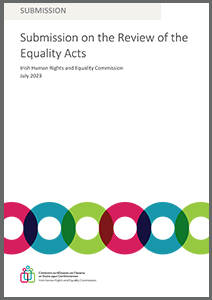 The Commission has published a second set of recommendations to Government as part of ongoing engagement with the Review of the Equality Acts, including the Equal Status Acts 2000-2018 and the Employment Equality Acts 1998-2015.
The Commission has published a second set of recommendations to Government as part of ongoing engagement with the Review of the Equality Acts, including the Equal Status Acts 2000-2018 and the Employment Equality Acts 1998-2015.
The submission, sets out over 55 specific recommendations on access to justice and legal aid; on exemptions under the Equality Acts; on protected grounds; on positive duties; on positive action and measuring effectiveness and data collection. It also recommends the introduction of a ‘purpose and principle clause’ to guide implementation of the law.
In recognition of the significant opportunity to reform the equality code, we established an ‘Advisory Committee on the Future of Equality Legislation’ (‘the FELAC’). The FELAC brought relevant legal and civil society experts together with Commission members to assist the Commission in identifying and examining the key issues that must be addressed to build a more comprehensive and effective framework of equality legislation and to support equality infrastructure. We also sought advice from our Disability Advisory Committee (‘DAC’) on the definition of disability in the Equality Acts and other relevant issues to the Review.
As Ireland’s national equality body, the Commission is recommending that equality legislation be changed to include discrimination on the ground of socio-economic status and on the ground of criminal conviction.
On the introduction of a socio-economic status ground, and following two decades of calls for its introduction, the Commission believes “it is a matter of justice that this ground be incorporated into Irish legislation” and its introduction would not only strengthen the effectiveness of the Equality Acts, but would constitute a crucial shift in the equality landscape in Ireland (See page 50 of submission).
On the introduction of a criminal conviction ground, the Commission recommends the inclusion of a broad prohibition on discrimination on the ground of criminal conviction that is not limited to spent convictions, in both the Employment Equality Act and the Equal Status Act, and further research, safeguarding victims’ rights, to be conducted to determine the appropriate exemptions needed in relation to this ground (See page 67 of submission).
The Commission has also recommended change to the existing gender and family status grounds. The gender ground in the Equality Acts, should be amended to include explicit reference to, and define gender identity, gender expression, and sex characteristics (See page 57 of submission). The ‘family status’ ground should be renamed the ‘carer’ status ground, and be defined to ensure a broader range of parents and persons who provide care to adults are protected.
Background
In June 2021, the Minister for Children, Equality, Disability, Integration and Youth launched a consultation seeking the public’s view on the review of the Equality Acts. The aim of the review was to examine the operation of the Acts. Views were sought on the scope of the current definitions of the nine equality grounds, and whether new grounds should be added such as the ground of socio-economic status discrimination. The Review has been taking place in the wider context of developments in equality standards at an EU level. In December 2022, the European Commission adopted two proposals which aim to ensure a better application and enforcement of EU anti-discrimination rules by creating binding standards for Equality Bodies to ensure people in all Member States enjoy a common minimum level of protection against discrimination.
In our first submission to the Review, we highlighted the structural inequalities which were exacerbated due to the Covid-19 pandemic and called on the State to ensure the next generation of equality legislation adopted a proactive model of promoting equality by combating all emerging and cumulative forms of discrimination, addressing the procedural and accessibility issues impacting on access to justice, and ensuring awareness of rights.
Submission on the Review of the Equality Acts Accessible word version